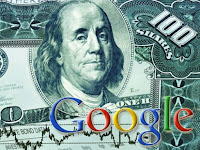Coulda, woulda, shoulda
 August 2004. Google
was going public. $85 a share. There was a complicated way to get in at that
price – you had to get some form or something ahead of time. I couldn’t quite figure it out and figured
I’d jump in hour one. Shares were at
$105 by the time I logged in and it was going north fast. I was all set to buy some shares – but it was
going so high so quickly I reasoned it would tank equally as quickly. I opted to watch rather than play. It’s historic high (so far) was $715. The $530 per share profit that I would have realized
would have come in mighty handy on many occasions since then. Instead of having a huge profit, it goes down
as one of my coulda, woulda, shoulda.
August 2004. Google
was going public. $85 a share. There was a complicated way to get in at that
price – you had to get some form or something ahead of time. I couldn’t quite figure it out and figured
I’d jump in hour one. Shares were at
$105 by the time I logged in and it was going north fast. I was all set to buy some shares – but it was
going so high so quickly I reasoned it would tank equally as quickly. I opted to watch rather than play. It’s historic high (so far) was $715. The $530 per share profit that I would have realized
would have come in mighty handy on many occasions since then. Instead of having a huge profit, it goes down
as one of my coulda, woulda, shoulda.
JP Mortgage Chase announced
last week that they lost $2.3 billion on trades. It’s not quite the same as my phantom loss,
theirs is real. At the end of last year
their Balance Sheet showed assets of $2.65 trillion – so while $2.3 billion is
a lot of money to a lot of people, it’s just 0.08% of the company’s value. That’s what ‘too big to fail’ has resulted in
– a situation where a $2 billion loss is nearly a rounding error!
The basic stock philosophy of “buy low-sell high” is on
steroids with hedge fund managers. There
is a near-hysteria about the loss in Congress and the media. “Another financial catastrophe is upon
us!” “We need MORE regulation.” The critics seem to forget (or ignore) the
fact that the company has broken no laws
or regulations – they just made a bad investment. Their investors will punish them, as they should.
Capitalism’s base tenet is that there have to be winners and
losers. It’s not an equalizing
situation, but to be able to win big there has to be losses somewhere as
well. When returns are significant and
everybody is making money the call for regulation and enforcement is
muted. Whenever money is lost government
wants to protect people from themselves and pass a bunch of regulations and
laws to protect against the pain of loss.
The problem is that without loss there can be no gain.
The stock market has reached the highs of the pre-Great
Recession. In 2008 the Dow average was
6,547.05. Today it is 13,252.76. It has more than doubled while the rest of
the economy has stalled. The market
restored itself. How did it happen? Lots of ways, but essentially by some people
taking a risk and investing when others didn’t.
There wasn't a hue and cry for more regulation during this ramp up period, was there? Had I still had financial resources in 2008 I would have bought like crazy when
the market was so low. Over the past
four years some have made money, some have lost. But the government didn’t set the parameters.
If an investor wanted a large return and
gave their money to increase it, then they took the risk and they get the
reward. Protecting against the risk is
the antithesis of fair play and of capitalism in general.
The uproar is because in 2008 the U.S. Government set the
precedent that no matter what, it would bail out the banks. No consequence for errors or risky transactions. So when a story emerges that somebody appears
to be cavalier and loses $2.3 billion, taxpayers take notice because they are
the backstop to the investors. And
therein lies the fundamental problem. If
JP Morgan screwed up and people invested in them, then they should be the ones
to bear the loss, not the U.S. taxpayer (or more accurately the Chinese banks).
President Bush famously said he: “abandoned free market principles to save the
free market system.” The absurd
statement manifested into policy implemented and continued under President
Obama. The only way to let the free
market work is: let the free market work.
Facebook is going public tomorrow. I’ll be a spectator there as well thanks to
my current fiscal reality resulting from Bush-Obama's economic policies. The FB ticker will be another
woulda, coulda, shoulda. Best if I consider it my version of my Dad's Red Alfa Romeo he sold for a few hundrd bucks back in the day that today would be worth 6 figures.



Comments
Post a Comment